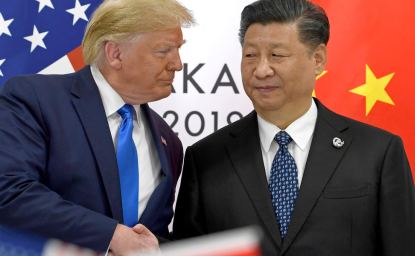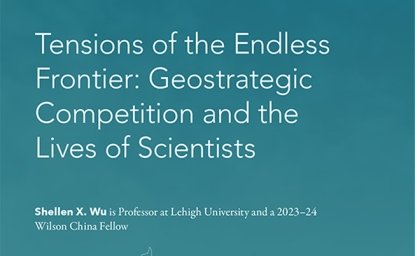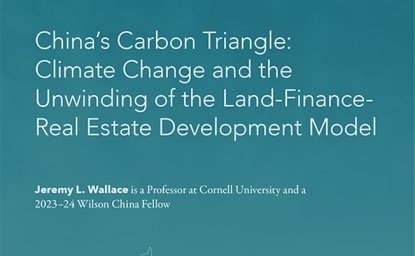On December 2, 1942, Italian physicist Enrico Fermi conducted the first ever self-sustaining fission chain reaction. On the same day 74 years later, President-elect Trump triggered a diplomatic chain reaction by conducting a phone call with Taiwanese president Tsai Ing-wen—a move that broke with nearly four decades of U.S. diplomatic protocol. Following a measured response from Beijing, Trump went on to question the importance of the “One China” policy.
I wrote in last December’s issue that the ability to shape regional and international orders had become the measuring stick for the cooperative and competitive sides of Sino-American relations in 2015. 2016 saw a emergence of geostrategic issues, such as cross-Strait relations and the South China Sea, that were thought to be manageable under old dispensations but which loom as hot spots in 2017. These developments were accompanied by a surge in articles and commentary in the United States questioning the American engagement with China and advocating for a tougher approach to China or more reciprocity in the relationship.
Sandy Pho
Senior Program Associate, Kissinger Institute
Major Issue Tracker
U.S. Politics
Why is Donald Trump’s Chat with Taiwan an Issue? (December 5): A change in protocol by the president-elect caused confusion over Taiwan’s international status. The Guardian, The Financial Times, and NPR reported the story. Related: Bob Dole Helped Taiwan with Trump Contacts Over 6-Month Period; Trump’s Taiwan Phone call was Long Planned
Trump Picks Iowa Governor as U.S. ambassador to China (December 7): According to Reuters, the appointment of Terry Branstad might ease trade tensions between the U.S. and China and suggests that Trump may take a less combative stance towards China than many expected. Related: I Think That Chinese Official Really Liked Me! (Subscription)
Rubio Targets Chinese Aggression in South China Sea (December 8): U.S. Senator Marco Rubio (R-FL) introduced the South China Sea and East China Sea Sanctions Act last month, which would punish Chinese individuals and entities that participate in Beijing’s illegitimate operations in the South and East China Seas. The Diplomat (subscription), Foreign Policy (subscription) and Sunshine State News all reported the story.
Trump Questions One China Policy (December 12): According to Reuters, following his phone call with Taiwan President Tsai Ing-wen, president-elect Trump told Fox news the United States is not bound by the One China policy “unless we make a deal with China having to do with other things, including trade.” Related: Beijing ‘Seriously Concerned” after Trump Questions “One China” Policy; Trump Risks War by Turning the One China Question into a Bargaining Chip.
Trump picks China Hawk for New Trade Post (December 22): President-elect Donald Trump picked China critic Peter Navarro to lead the newly created White House National Trade Council. The University of California, Irvine professor, who wrote a book called "Death by China," will serve as director of trade and industrial policy. Related: Review: Peter Navarro's ‘Crouching Tiger’
The U.S. Rebalance to Asia
U.S.-China High-Level Joint Dialogue on Cybercrime (December 8): Press release from the U.S. Department of Justice on outcomes of the dialogue.
Abe visits Pearl Harbor (December 27): As reported by Al Jazeera, the December 27th meeting was a further step in the reconciliation process between the two wartime enemies. The visit to Pearl Harbor included joint speeches by Prime Minister Abe and President Obama. Related: China Dismisses Abe’s Pearl Harbor visit, Suggests Japan is Unrepentant
Southeast Asia and the South China Sea
Duterte Gets Trump White House Invite During ‘Animated’ Call (December 2): According to an aide to Philippine President Rodrigo Duterte, President-elect Trump invited Duterte to the White House next year in a “very engaging, animated” phone conversation… The Trump transition team has not confirmed the invitation. Related: Philippines’ Deadly Drug War Praised By Donald Trump, Says Rodrigo Duterte.
British Fighters to Overfly South China Sea; Carriers in Pacific after 2020 (December 2): Britain’s ambassador to the United States, Kim Darroch, said last month that as the British update and renew their forces, “they will be seen in the Pacific.” She went on to say that “…we absolutely share the objective of the U.S. administration…to protect freedom of navigation.”
Military
China Returns U.S. drone, says Washington 'hyped’ incident (December 18): According to Reuters, China will return an underwater U.S. drone seized by a naval vessel in the South China Sea on December 16th. Beijing objected to Washington’s going public with the incident. Related: Does China Really want to be the South China Sea’s Policeman?; Pentagon Demands China Return US Underwater Drone
Cyber, Technology, and Surveillance
White House Concerned over China’s Cybersecurity Law (December 8): The White House issued a press release about China’s new cyber security law during a meeting with a Chinese official after the latest round of talks between the two countries on cybercrime…Read More>>
Media and Soft Power
Schumer Calls for Scrutiny of Wanda Group and other Chinese Investors (December 1): Senate Minority Leader-elect Charles Schumer (D-NY) wrote a letter to Treasury Secretary Jack Lew and U.S. Trade Representative Michael Froman last month, voicing concern over Chinese investments in U.S. industries, including film. The Senator believes the acquisitions “may not be receiving sufficient review” from regulators…Read More>>
Tech Giants Push Back Against China’s Cyber Security Bill (December 2): Intel, Microsoft, and IBM, have come out against China’s new regulations…Read More>>
Wanda Boss Warns U.S. on Anti-China Policies (December 11): Wang Jianlin, chairman of China’s Wanda group, said in October that his moves into Hollywood were commercial, not political. Despite such assurances, Wang recently warned President-elect Trump about protectionist policies aimed at China. “I’ve invested $10 billion in the U.S. employing over 20,000 people. If something goes wrong, these 20,000 people might be out of jobs.”
Why China and Hollywood Don’t Mix (December 21): Despite backing from China's largest cinema operator, possibly the biggest marketing campaign in the country's history, and a plum holiday-weekend release, Hollywood-China joint venture "The Great Wall" was only the third-biggest opening of the year …Read More>>
Propaganda with a Millennial Twist Pops Up in China (December 31): As reported by the New York Times (subscription), the Chinese government has hired a digital media firm to promote positive images of national identity. Kissinger Institute Global Fellow Anne-Marie Brady comments that the Chinese government needs new media to reach younger audiences, and that “many young people have grown accustomed to bypassing official censorship.”
China State Broadcaster Rebrands (December 31): Chinese state broadcaster Central China Television (CCTV) rebranded its international networks and digital presence under the name China Global Television Network. The broadcaster said it made the move to “integrate resources and to adapt to the trend of media convergence,” with foreign language channels, video content and digital media falling under the new group…Read More>>
Education and Civil Society
China’s President Preaches Ideological Purity in Universities (December 12): As reported by the Washington Post, Chinese President Xi Jinping told government and university officials at a meeting on ideological and political work in higher education that China “must build colleges into strongholds that adhere to Party leadership.”
Western Education with Chinese Characteristics (December 6): While 523,700 Chinese students set sail for foreign universities in 2015, many decided to stay in China to attend one of the many international universities that have set up campuses on the Mainland in recent years, such as NYU Shanghai…Related: Surge in Foreign Students May be crowding Americans out of Elite Colleges (subscription)
Chinese Education Giant helps Students Game SAT (December 23): New Oriental Education & Technology Group Inc., China's largest private education company, has subverted efforts to prevent cheating…Read More>>
China Publishes Supervisory List for Foreign NGOs (December 20): China's Ministry of Public Security published a list of government bodies that will act as go-betweens for the ministry and foreign non-governmental organizations (NGOs), ahead of the enforcement of a cyber security and a law targeting foreign NGOs…Read More>>
Tyrus Wong, Pathbreaking California Artist, Dies at 106 (December 30) Tyrus Wong, who arrived at Angel Island as a 10-year-old immigrant from China in 1920 and went on to a career as one of the California’s most important modern artists, died at age 106…Read More>>
Trade and Economic Relations
U.S.-China Economic and Security Review Commission Bulletin (December 6): U.S. exports to China jumped 11.3 percent year-on-year in October 2016, leading to a smaller deficit…Read More>>
Michael Jordan Scores China Legal Victory (December 7): China’s Supreme People’s Court revoked the rights of local sportswear-maker Qiaodan Sports Co. to use Michael Jordan’s Chinese name, handing a partial victory in Jordan’s four-year campaign to protect his brand. Read More>>
EU, U.S. Refuse China Market Economic Status Under WTO (December 12): When China joined the World Trade Organization 15 years ago, a provision was set to grant market economy status for China in the EU, the US and Japan in December 2016. As reported by CCTV America, the European Commission continues to be concerned about cheap steel coming from China. The Financial Times also reported the story.
The Fed Puts China in a Bind (December 20): As reported by Bloomberg, China has maintained a "soft peg" of the yuan for the past decade, allowing it to rise and fall within a narrow band against the U.S. dollar. This has worked, for the most part, because the two countries have had relatively synchronous business cycles and broadly similar monetary policies. But now their economies are diverging in important ways.
China's Alibaba back on U.S. Counterfeits Blacklist (December 22): Chinese e-commerce giant Alibaba is back on the U.S.'s "notorious markets" list of firms that sell counterfeit goods. Alibaba was taken off the list four years ago, but authorities say the firm's online platform Taobao is used to sell "high levels" of fake goods…Read More>>
If You Read/Watched Nothing Else in December…
The fine writing and film/videography on U.S.-China relations published each month far exceeds the assimilating capacity of any institution. It would be ridiculous to feature “the best” efforts of the past 30 days, but KICUS would like to highlight the following work nonetheless:
Podcasts and Radio
How China is Reacting to Trump’s Taiwan Call (NPR, December 6)
Blogs
An Open Letter to Donald Trump on the One-China Policy (Richard Bush, Brookings, December 13)
Op-Eds and Essays
The Real Risk behind Trump’s Taiwan Call (Evan Osnos, The New Yorker, December 3)
Reality Check: Trump's Taiwan Call Was a Step toward Balanced Relations (Dan Blumenthal and Randall Schriver, The National Interest, December 5)
China and the World (Evan A. Feingelbaum, Foreign Affairs, December 12)
Report
Chinese Investment in the United States: Recent Trends and the Policy Agenda (Thilo Hanemann and Daniel H. Rosen, Rhodium Group, December 2016)
Interviews
The Communist Domino that Would Not Call: China’s Resilience at the End of the Cold War (Ambassador J. Stapleton Roy and Charles Kraus, Wilson Quarterly, Fall 2016)
Video
The Year in U.S.-China Relations 2016: "It's Not Dark Yet..." (Kissinger Institute, December 15)
Thanks for reading and for your continued support of
The Kissinger Institute on China and the United States.




